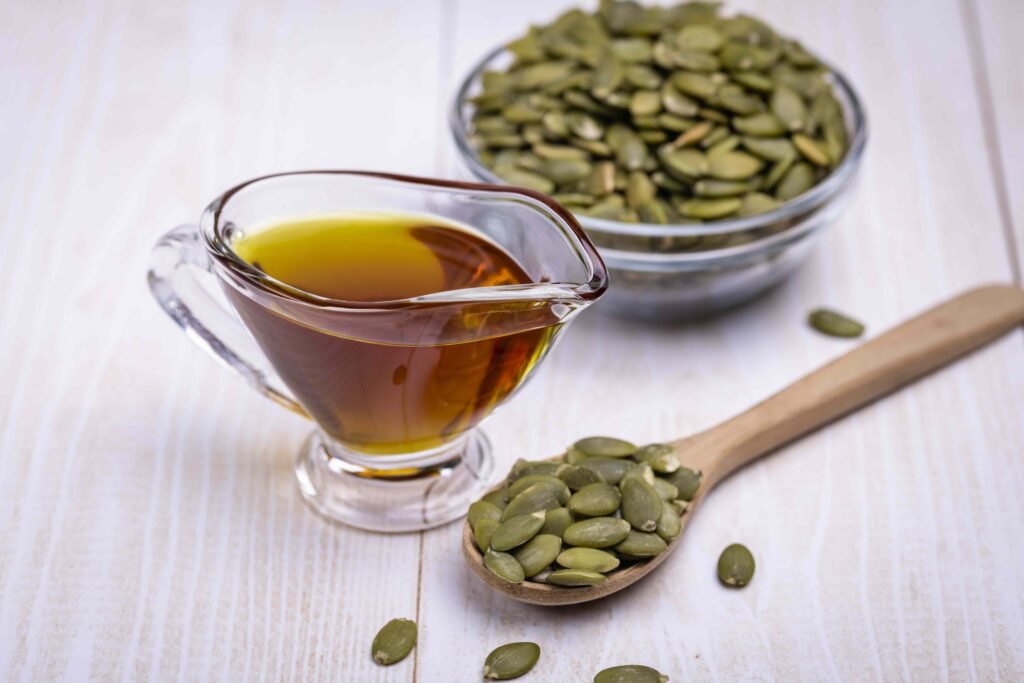Pumpkin seed oil, or pepita oil, is an extract of pumpkin seeds available as a cooking oil, dietary supplement, or topical formulation. You can consume or apply pumpkin seed oil for a range of health benefits.
Pumpkin seed oil may boost skin health and promote hair growth. Though more research is needed, here’s what studies found:
- Male pattern hair loss: Topical or ingested pumpkin seed oil may promote hair regrowth. In a small study of men with pattern baldness, those who took 400 milligrams (mg) of pumpkin seed oil supplements every day reported satisfactory hair regrowth at 24 weeks.
- Female pattern hair loss: Three months of applying pumpkin seed oil to the scalp led to hair regrowth in women with female pattern hair loss. Results showed it was less effective than a common hair regrowth treatment, Rogaine (minoxidil).
- Eczema: This autoimmune disorder that causes dry, scaly, and itchy skin. In a small study of adults with chronic hand eczema, topical pumpkin seed oil reduced symptoms at 28 days. It worked better than a common moisturizing cream, though not as well as steroid treatment.
- Acne: Topical pumpkin seed oil was effective for reducing outbreaks of pimples, blackheads, and other acne signs in a small study of 20 young adults. At three months, they saw an 84% reduction in symptoms, on average.
Research from 2025 suggests that pumpkin seed oil may promote heart and blood vessel health due to its anti-inflammatory properties.
In a small study from 2019, participants took 3 grams of pumpkin seed oil in supplements for six weeks. Researchers found that arterial stiffness was reduced and function improved. This may help prevent hypertension (high blood pressure), which raises the risk of heart disease.
High cholesterol also raises heart disease risk. Studies suggest that pumpkin seed oil may also lower levels of low-density lipoprotein (LDL, or “bad”) cholesterol—protecting heart health in that way, as well.
Pumpkin seed oil may also benefit the prostate gland. Human and animal studies found supplements managed symptoms benign prostatic hyperplasia (enlarged, noncancerous prostate). In a 2015 study of over 1,400 older men, daily use of pumpkin seed oil for one year led to significantly reduced symptoms.
Studies have also linked pumpkin seed oil to improved urinary health. In a study of adults with overactive bladder syndrome, 12 weeks of 10 grams of pumpkin seed oil a day reduced symptoms like sudden, uncontrollable urges to urinate.
Some early evidence from 2011 suggests that supplementing with pumpkin seed oil may also help with menopause symptoms such as hot flashes. More research is needed, but experts believe this benefit may be due to the plant estrogens pumpkin seed oil contains.
Pumpkin seed oil may help with mental health, according to research done in rat models of depression. These research results need to be confirmed in larger studies done in humans. However, some other research suggests that pumpkins and seeds may both have antidepressant properties.
A 1-tablespoon serving of pumpkin seed oil contains:
- 130 calories: Pumpkin seed oil, like other oils, is a calorie-dense food.
- 14 grams total fat: Pumpkin seed oil is mostly made up of fat. Most of this is healthy fat, with 53% polyunsaturated and about 43% monounsaturated fat.
- 7.5 grams polyunsaturated fats: Polyunsaturated fats (PUFA) are the healthy type that help to lower LDL cholesterol. They’re high in linoleic acid, an essential, omega-6 polyunsaturated fat linked with cardiovascular and anti-inflammatory effects.
- 6 grams monounsaturated fats: Pumpkin seed oil is loaded with the monounsaturated fat, oleic acid. These fatty acids lower LDL cholesterol levels while boosting high-density lipoprotein (HDL) cholesterol, a healthy type.
- 1.5 grams saturated fats: These “unhealthy” fats are associated with a range of health conditions. Pumpkin seed oil is not a significant source, like butter or red meat is.
- 0 grams cholesterol: Pumpkin seed oil isn’t a source of cholesterol. It also contains no sodium (salt) or trans fats.
Here’s how to use, take, or apply pumpkin seed oil.
With Food
Pumpkin seed oil is known for its rich, nutty taste. This makes it an excellent ingredient in salad dressing or drizzled on cooked food to enhance flavor.
For cooking or frying, pumpkin seed oil may not be the best option. Its smoke point (the temperature at which it burns) is about 320-338 degrees Fahrenheit. This is lower than other cooking oils, such as canola oil, which may be better choices for high-temp cooking methods.
As Supplements
You can get pumpkin seed oil supplements from online suppliers and natural foods stores. Typically coming in a gel tab form, you get 1,000 to 2,000 mg per serving. There’s no guidance on how much is recommended per day, though in the studies, results were seen with 400- to 500-milligram daily doses.
Topically for Hair and Skin
Pumpkin seed oil is a common ingredient in hair products. Generally, you rub a hair oil into your scalp several times per week. Leave it in for at least half an hour or overnight, shampooing it out and conditioning afterward. Follow the product directions—for most people, pumpkin seed oil is unlikely to cause irritation and it may be soothing to sensitive skin.
In general, pumpkin seed oil is safe to consume or use, especially in moderate amounts. Some people are allergic or sensitive to pumpkin seeds. This can cause hives (bumps on the skin) and itchiness with use or ingestion of pumpkin seed oil.
Before starting to supplement with pumpkin seed oil, talk to a doctor for their guidance. This is especially important if you have a chronic health condition or take medications.

